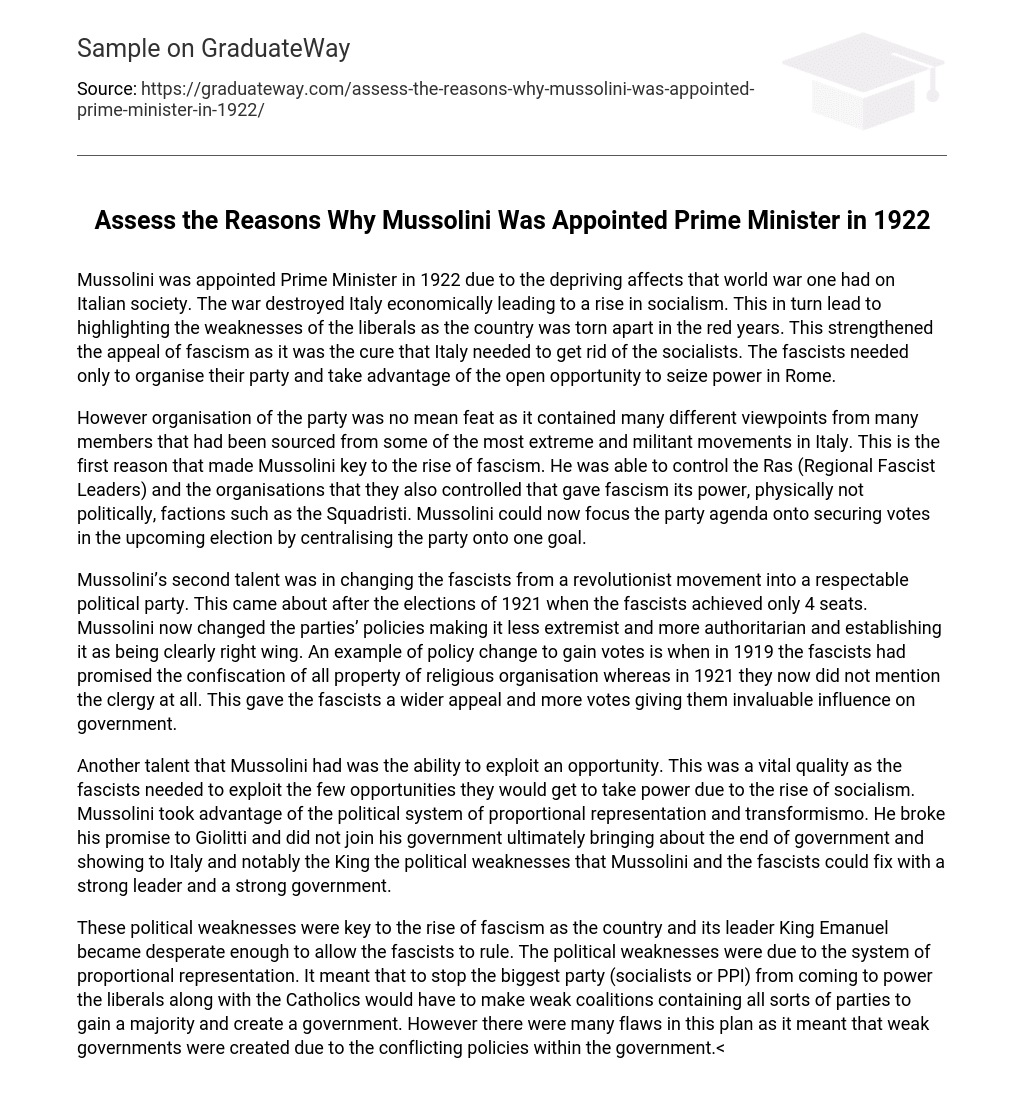Mussolini was appointed Prime Minister in 1922 due to the depriving affects that world war one had on Italian society. The war destroyed Italy economically leading to a rise in socialism. This in turn lead to highlighting the weaknesses of the liberals as the country was torn apart in the red years. This strengthened the appeal of fascism as it was the cure that Italy needed to get rid of the socialists. The fascists needed only to organise their party and take advantage of the open opportunity to seize power in Rome.
However organisation of the party was no mean feat as it contained many different viewpoints from many members that had been sourced from some of the most extreme and militant movements in Italy. This is the first reason that made Mussolini key to the rise of fascism. He was able to control the Ras (Regional Fascist Leaders) and the organisations that they also controlled that gave fascism its power, physically not politically, factions such as the Squadristi. Mussolini could now focus the party agenda onto securing votes in the upcoming election by centralising the party onto one goal.
Mussolini’s second talent was in changing the fascists from a revolutionist movement into a respectable political party. This came about after the elections of 1921 when the fascists achieved only 4 seats. Mussolini now changed the parties’ policies making it less extremist and more authoritarian and establishing it as being clearly right wing. An example of policy change to gain votes is when in 1919 the fascists had promised the confiscation of all property of religious organisation whereas in 1921 they now did not mention the clergy at all. This gave the fascists a wider appeal and more votes giving them invaluable influence on government.
Another talent that Mussolini had was the ability to exploit an opportunity. This was a vital quality as the fascists needed to exploit the few opportunities they would get to take power due to the rise of socialism. Mussolini took advantage of the political system of proportional representation and transformismo. He broke his promise to Giolitti and did not join his government ultimately bringing about the end of government and showing to Italy and notably the King the political weaknesses that Mussolini and the fascists could fix with a strong leader and a strong government.
These political weaknesses were key to the rise of fascism as the country and its leader King Emanuel became desperate enough to allow the fascists to rule. The political weaknesses were due to the system of proportional representation. It meant that to stop the biggest party (socialists or PPI) from coming to power the liberals along with the Catholics would have to make weak coalitions containing all sorts of parties to gain a majority and create a government. However there were many flaws in this plan as it meant that weak governments were created due to the conflicting policies within the government.
This meant that the governments could not tackle the crisis within Italy of the red years and inflation. Meaning that many voters began to look towards more extreme and new parties for an alternative way and for change. PR also meant that these extreme parties now had influence as they were now needed to maintain a government. As well as this the fascists were also increasingly needed to use force on behalf of the government against socialists making an unstable situation that Mussolini exploited. The use of force was another factor that played a role in the rise of fascism.
The actions of the fascists up to 1922 are for me the true reason for the appointment of Mussolini. The main action the fascists used was violence. They did not topple socialism with votes but crushed it using military tactics and squads of men trained in violence the Squadristi. They would target socialists in a local area and take over power of that territory by destroying socialist buildings and prominent figures. They were also fond of making enemies drink castor oil as a kind of torture. There were also other factors that played a role in the rise of fascism such as its wide appeal, support and its actions.
The fascists had support anywhere that either feared socialism or was nationalistic. The original support came from war veterans and the Italian army which was in general sympathetic to the cause. However as Mussolini changed the party agenda making it less extreme and right wing the backbone of fascist support arrived in the form of the petty bourgeoisie. Fascism also gained the support of the elite in Italy meaning that the party now had funding from big industrialists which it could use to secure its power.
Fascism now had a strong appeal throughout Italy as it was now a respectable party not a political movement which had the support of powerful people that would enable it to crush the threat of socialism and restore the nation to its former (roman) glory. The actions of the fascists up to 1922 were the reason why Mussolini came to power or was able to seize it. The economic issues in Italy lead to the rise of fascism. Mass unemployment meant that the socialists were rising in number. This meant that powerful industrialists turned to fascism as they would stop the trade unions from deciding workers’ rights.
This leads to funding for the fascists helping them gain power. The economic crisis had brought about a huge rise in the support of socialism. The fascists became ever more appealing as their policies were anti socialist. They were not weak like the liberals in tackling socialism as they used organised violence such as the Squadristi to crush the socialists. Also the party gained support from the petty bourgeoisie as the failing economy meant that they would be the first to fall into the working class because of rising inflation.





